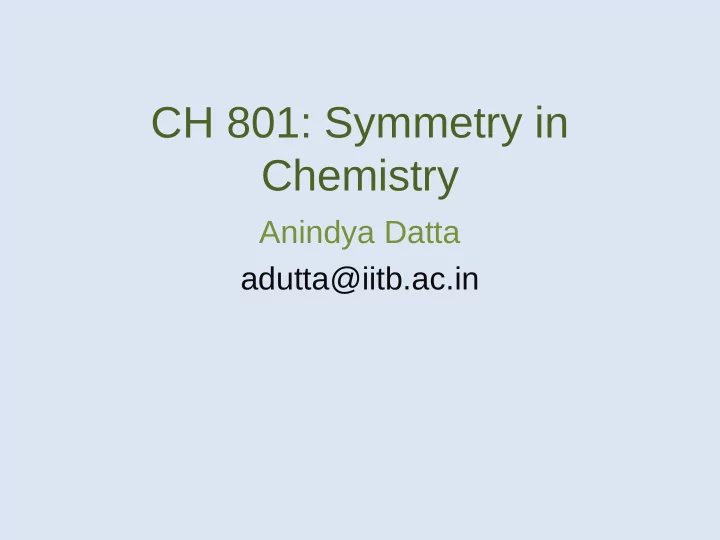

CH 801: Symmetry in Chemistry Anindya Datta adutta@iitb.ac.in
What we will learn • Symmetry classification of molecules: Symmetry Point Groups • Matrices: Geometry to algebra • Representations: Reducible and Irreducible • Group theory: Great Orthogonality Theorem • Character Tables: What, how and why • Symmetry Adapted Linear Combinations (SALCs) • Molecular Orbital Theory of Organic Compounds using SALCs • Inorganic Complexes • Molecular Vibrations (if time permits) 2
Text books 3
What we will learn • Symmetry classification of molecules: Symmetry Point Groups • Matrices: Geometry to algebra • Representations: Reducible and Irreducible • Group theory: Great Orthogonality Theorem • Character Tables: What, how and why • Symmetry Adapted Linear Combinations (SALCs) • Molecular Orbital Theory of Organic Compounds using SALCs • Inorganic Complexes • Molecular Vibrations (if time permits) 4
5
Symmetry element and operation Symmetry Operation Symmetry element Something done to a molecule A geometrical entity that leaves it in an equivalent with respect to which configuration the operation is performed Point: Inversion ( i ) Line: Simple rotation ( C n ) Complex Rotation ( S n ) Plane: Reflection Principal axis of symmetry: The axis with the largest n value Horizontal plane: Plane of reflection to which the principal axis is perpendicular Vertical Plane: Contains the principal axis Dihedral plane: Vertical plane which bisects the angle between C 2 axes 6
Symmetry point groups: Classification by Symmetry Operations 7 https://www2.chemistry.msu.edu/faculty/reusch/virttxtjml/symmetry/symmtry.htm
Symmetry point groups: Classification by Symmetry Operations σ v ’ O H H σ v C 2 8 https://www2.chemistry.msu.edu/faculty/reusch/virttxtjml/symmetry/symmtry.htm
Recommend
More recommend